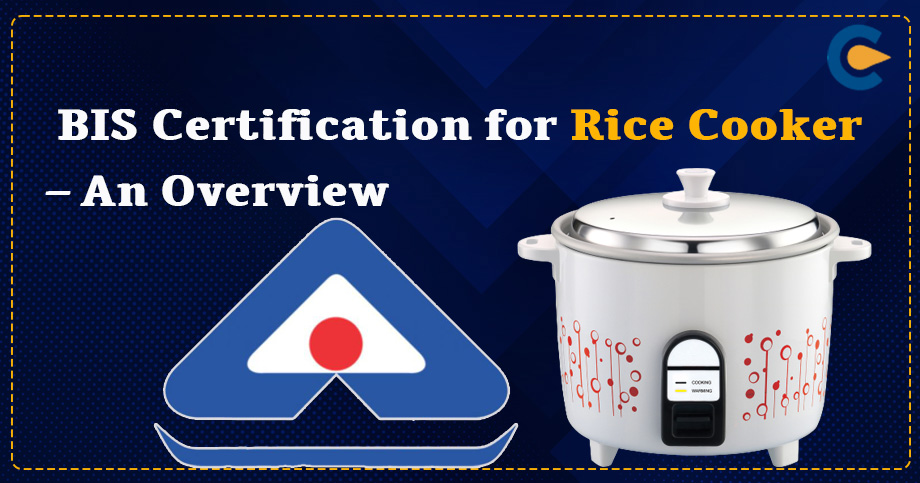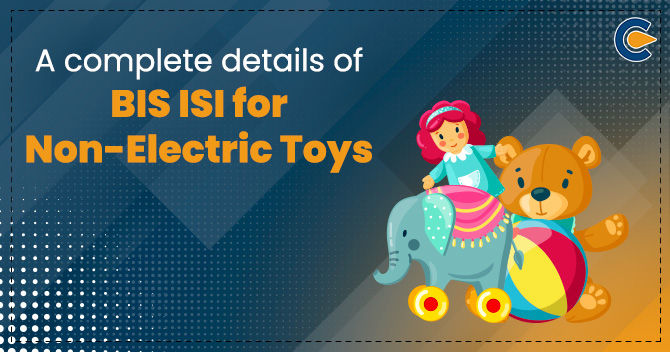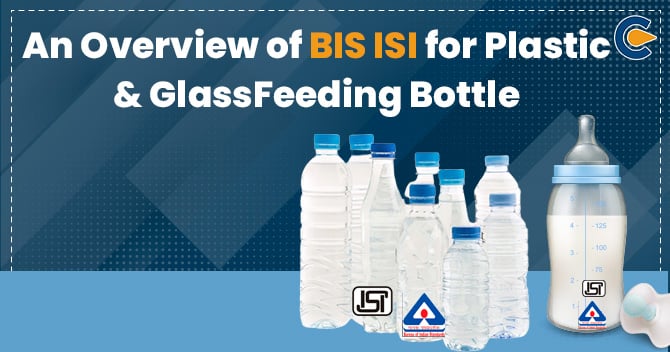BIS Registration is required for Rice cookers, categorised under IS 302 (Part 2). It falls under the List of Electronics and IT Goods under the ‘Compulsory Registration Scheme’ for Self Declaration of Conformity-Notified by the Ministry of Electronics and Information Technology[1]. Before the shipment of rice cookers to the Indian consumer market, the Compulsory Registration Scheme (CRS) mandates that manufacturers obtain BIS Certification for Rice Cooker. This compliance is required by the Bureau of Indian Standards (BIS). A manufacturer is not permitted to sell items in India without a permit, which BIS grants after testing the item. Scroll down to check more details regarding BIS Certification for Rice Cooker.
What is a BIS Certification?
The Bureau of Industrial Standards (BIS) was created under the BIS Act 2016. It is India’s National Standard Body. It is responsible for the harmonious development of marking, standardisation, and quality certification activities for goods and related or incidental matters. The BIS is an organisation that ensures consumers are consuming high-quality goods and can rely on them regarding safety and health. BIS ensures a quality certificate for products and provides customers with safe and dependable products by minimising health and other risks. The BIS is responsible for a variety of duties, including:
- Product Certification scheme
- Standards Formulation
- Compulsory Registration Scheme (CSR)
- hallmarking of the products
- ISI certification to the products
- Product testing through lab tests
- Testing of manufacturing premises
- Keeping a check on Consumer Affairs Activities, etc.
On April 1, 2020, the Bureau of Indian Standards issued an announcement and drafted the safety standard for the quality testing of electric rice cookers. Before being sold on the Indian market, all-electric rice cookers must be Quality Tested and obtain a BIS Certification for Rice Cooker.
What is CRS?
Compulsory Registration Scheme or CRS works under Scheme II of BIS (Conformity Assessment) Regulations, 2018. Ministry of Electronics & Information Technology and the Bureau of Indian Standards jointly launched the Compulsory Registration Scheme (CRS) in 2012. (BIS). Ministry of Electronics & Information Technology (MeitY) has notified “Electronics and Information Technology Goods (Requirement for Compulsory Registration) Order, 2012” on 3rd October 2012 for fifteen categories of electronics items. Another 15 product categories were added by MeitY under this order on 13 Nov 2014.
Another 13 product categories were added by MeitY under this order on 23 August 2017. Under this scheme, manufacturers are required to register their products before releasing them on the market. The products undergo safety testing following the applicable IS standard. Foreign manufacturers are required to have a local representative in India who will be in charge of distributing their products. Rice cooker is included on the List of Electronics and IT Goods under the “Compulsory Registration Scheme” for self-declaration of conformity, as notified by the Ministry of Electronics and Information Technology. BIS Certification for Rice Cooker is essential before marketing them in India.
Required Specifications of Rice Cooker
Before launching or importing rice cookers into the Indian market, all models and brands must obtain BIS Certification for Rice Cooker under IS 302 (Part 2/Section 15). BIS Registration can be granted to the product’s manufacturers (Indian or foreign) and not to the product’s trader, dealer, or distributor. The Bureau of Indian Standards has mandated that electric rice cookers be registered under the Product Registration Scheme by April 2021. The manufactured product must comply with IS 302-2-15: 2009. BIS took this action to protect the Indian consumer.
Tests to Check Quality Standards of Rice Cooker
- Rice Cooking Quality and Time Taken
- Highest Temperature Achieved While Cooking Rice
- Security tests
- Safety against moving parts and electric shock
- Current leakage (A) and electrical insulation
- Endurance of the material
- Quality tests
- Input Energy at Maximum Capacity
- Automatic Operating
- Physical test
- Capacity
- Net mass
- Extension cord length
- Additional accessories
- Simple Maintenance
- Ease of Maintenance/Cleaning
Documents necessary for BIS Certification for Rice Cooker
Following is the list of all the vital documents required for BIS Certification for Rice Cooker:
- Completely filled CDF/CCL form
- Duly filled BIS application form
- Business License of manufacturing unit
- The scope of the Business License
- ISO certificate of the manufacturer
- Marking Label/ Details of Marking on the product
- Authorisation letter (If the signatory person is other than the head of the manufacturing)
- Trade Mark Certificate
- Trademark Authorization Letter (If TM is owned by other than the manufacturer)
- Authorized Indian Representative Company registration proof in INDIA (in case of the foreign manufacturer)
- Photo ID of Authorised Indian Representative/ Authorized Signatory
- Technical Specification Sheet of Product/user manual
Procedure for Acquiring BIS Certification for Rice Cooker
The BIS Registration process for domestic (Indian) manufacturers is different from that of a foreign manufacturer.
- Obtaining a BIS Certification for Rice Cooker and other similar products requires several steps. The procedure to be followed by a Foreign Manufacturer are-
- In the application process for a foreign manufacturer, an AIR is appointed.
- The Application must be accompanied by all the necessary documents
- The applicant must submit the product sample to a BIS-approved laboratory for testing
- The test report is obtained from the BIS laboratory. It must be submitted to the BIS office along with a copy of the online/hardcopy application form in the case of offline submission.
- The Application is examined by the BIS officer.
- After verifying the details, the licence is granted to the manufacturer or authorised agent representative (AIR).
- The procedure to be followed by an Indian Manufacturer are-
- The application form is submitted online, which must be accompanied by all the necessary documents
- The applicant must submit the product sample to a BIS-approved laboratory for testing
- The test report is obtained from the BIS laboratory. It must be submitted to the BIS office along with a copy of the online/hardcopy application form in the case of offline submission.
- The Application is examined by the BIS officer.
- After verifying the details, the licence is granted to the Indian manufacturer.
Conclusion
BIS has benefited the national economy through its core activities of standardisation and conformity assessment by providing safe, dependable, and high-quality goods, minimising health risks to consumers, protecting the environment, promoting exports and import substitutes, controlling the proliferation of varieties, etc. In addition to benefiting consumers and industry, BIS’s standards and certification programme also support various public policies, particularly in product safety, consumer protection, food safety, environmental protection, building and construction, etc. Considering the fundamental requirements of Indian BIS Certification, the procedure for BIS Certification for Rice Cooker – IS 302-2-15: 2009 varies depending on the location of the manufacturing unit. The BIS Registration process for domestic (Indian) manufacturers is distinct from the process for foreign manufacturers.
Read our Article:How to Get BIS ISI for Pressure Cooker?













